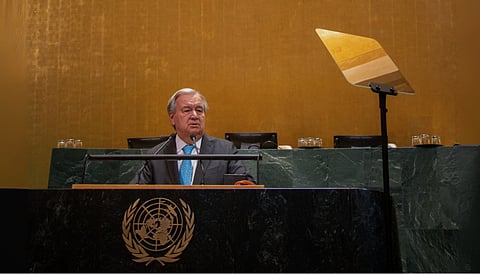

UN Secretary-General António Guterres says “hard-won gains are under attack” as conflicts, climate crises and online hate target women’s rights
President of the General Assembly Annalena Baerbock warns the “unfinished revolution” still leaves women facing violence, exclusion and inequality
Leaders highlight threats from artificial intelligence, call for investment in education, representation and grassroots women’s organisations
At the United Nations in New York, senior leaders have marked the 30th anniversary of the landmark Beijing Declaration on women’s rights with a stark warning: progress has been made, but equality remains distant and under threat.
UN Secretary-General António Guterres on September 22, 2023 told delegates at the high-level meeting that while the 1995 Beijing Declaration and Platform for Action had been “the most ambitious global political commitment on women’s rights ever achieved”, progress has been “slow and uneven”. No country, he said, had achieved full gender equality.
“Hard-won gains are now under attack,” Guterres cautioned, pointing to conflicts, climate disasters and an online “wave of misogyny” undermining women’s rights. He called for universal ratification of the Convention on the Elimination of All Forms of Discrimination Against Women and proactive steps to bring women into decision-making at all levels.
Guterres also highlighted the risks posed by artificial intelligence, describing an industry “dominated by men, shaped by biased data, and driven by algorithms that frequently reinforce discrimination”. Technology, he said, must “serve equality, not exclusion”, urging investment in girls’ education in science and technology.
He underlined that women’s participation in decision-making “is not a gift, it is a right”, and pledged that the UN would continue working towards gender parity across the organisation.
The President of the General Assembly, Annalena Baerbock, echoed these concerns, describing women’s rights as “unfinished business”. Drawing on Hillary Clinton’s famous words in Beijing – “women’s rights are human rights”, Baerbock said that for many young women today, the phrase should be self-evident, but persistent barriers showed how far there was still to go.
She pointed to ongoing gender-based violence, citing testimonies from Afghanistan and Sudan, and stressed that one in three women globally will experience sexual violence in their lifetime. She also highlighted inequalities in healthcare and family planning, warning against political and religious restrictions on women’s bodies.
Despite setbacks, Baerbock praised the resilience of women’s movements and the achievements of past generations. “When women are at the table, companies perform better, peace treaties last longer, and governments deliver more,” she said, urging leaders to match rhetoric with resources and representation.
“Women’s rights are always human rights,” Baerbock concluded. “They are our rights, our future.”